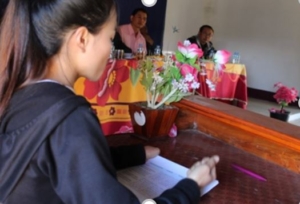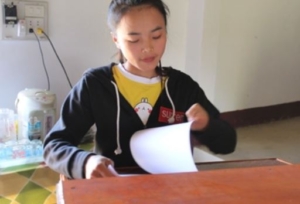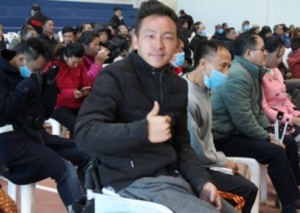Project
Strengthening the Equality of People with Disabilities and Community Development (SEPCoD)
-
Amount Funded
24,468 EUROProject Duration
01 Nov 2019 - 31 Dec 2020 -
-
Lead organisation
Lao Disabled People's Association (LDPA), Xiengkhouang Province
-
The Lao Disable People’s Association (LDPA), Xiengkhuang Province Branch was established in 2000, with the vision that people with disabilities are fully accepted and able to participate in all aspects of society, are given equal opportunity, and support, to reach their full potential, and can live life independently. In 2015, the Xiengkhuang Governor office signed an agreement letter for the establishment of the LDPA Xiengkhuang branch and recently, the Xiengkhuang Governor approved the new Board members of the Association. Since 2012 until now, there are some grants that support the LDPA XK branch:
- 2012-2013, LDPA XK Branch received funding of $70,000 from the CBN.
- August 2018, LDPA XK Branch was a development partner together with theParticipatory Development Training Center (PADETC).
- In 2018, it was funded by ADDP for $ 12,500.
- The Lao Women’s Rehabilitation Center funded 29 women/persons with disabilities (PWD)for vocational training with $20,400.
- Early 2018, The Ministry of Labor and Social Welfare, Department of Labor funded the building of the Office in Xiengkhuang province with $ 32,000
-
Organisation
The Lao Disable People’s Association (LDPA), Xiengkhuang Province Branch was established in 2000, with the vision that people with disabilities are fully accepted and able to participate in all aspects of society, are given equal opportunity, and support, to reach their full potential, and can live life independently. In 2015, the Xiengkhuang Governor office signed an agreement letter for the establishment of the LDPA Xiengkhuang branch and recently, the Xiengkhuang Governor approved the new Board members of the Association. Since 2012 until now, there are some grants that support the LDPA XK branch:
- 2012-2013, LDPA XK Branch received funding of $70,000 from the CBN.
- August 2018, LDPA XK Branch was a development partner together with theParticipatory Development Training Center (PADETC).
- In 2018, it was funded by ADDP for $ 12,500.
- The Lao Women’s Rehabilitation Center funded 29 women/persons with disabilities (PWD)for vocational training with $20,400.
- Early 2018, The Ministry of Labor and Social Welfare, Department of Labor funded the building of the Office in Xiengkhuang province with $ 32,000
-
Project
The Strengthening and Equality of People with Disability and Community Development (SEPCoD) project increases the capacity and participation of persons with disabilities (PWD) in social-economic development through two main objectives:- Strengthening their professional skills development and rights to access social activities concerning their participation in community development, and
- Supporting PWD in implementing equality and participation in the larger community development.
To reach these objectives, a set of activities is undertaken in three components: capacity strengthening of PWD in professions for their livelihoods, understanding and analysing the problem, and implementing and addressing the problem through a set of actions. The outcomes of these activities are beneficial to the community, especially on the equality between the general community and the PWDs thus creating sustainable income generation for people with disabilities.Furthermore, with the involvement of everyone in the design, planning, and implementation, the project addresses the needs of PWDs in increasing equality, social participation and community development integration with sustainable social-economic development and jobs as well as supporting the empowerment of civil society organisation (CSO) and/or community-based organisation (CBO) in their community development.
-
The Strengthening and Equality of People with Disability and Community Development (SEPCoD) project increases the capacity and participation of persons with disabilities (PWD) in social-economic development through two main objectives:
- Strengthening their professional skills development and rights to access social activities concerning their participation in community development, and
- Supporting PWD in implementing equality and participation in the larger community development.
To reach these objectives, a set of activities is undertaken in three components: capacity strengthening of PWD in professions for their livelihoods, understanding and analysing the problem, and implementing and addressing the problem through a set of actions. The outcomes of these activities are beneficial to the community, especially on the equality between the general community and the PWDs thus creating sustainable income generation for people with disabilities.Furthermore, with the involvement of everyone in the design, planning, and implementation, the project addresses the needs of PWDs in increasing equality, social participation and community development integration with sustainable social-economic development and jobs as well as supporting the empowerment of civil society organisation (CSO) and/or community-based organisation (CBO) in their community development. -
Xiengkhuang province has faced challenges of ensuring that People with Disabilities (PWD) have the capacities that would enable them to fully participate and partake in its social and economic development. At the same time, PWD lack professional skills and are often not fully aware of their rights to access social activities, especially concerning their participation in community development. They also suffer from systemic discrimination that does not allow them to equally participate in their communities. The “Strengthening the Equality of People with Disabilities and Community Development” (SEPCoD) project by the Lao Disabled People’s Association (LDPA) in Xiengkhuang aimed to mitigate these challenges.
Activities focussed on understanding and analysing the main issues followed by implementing and addressing them through a set of actions. The project reached a total of 20 PWD (7 women) aged between 23-60 years, while indirectly reaching 111 persons (64 women) aged 37-52 years that included mostly community members, but also several district government employees and LDPA Xiengkhuang employees. Fundamental to the activities was strengthening the PWD’s network for sharing experiences and comparing lessons learnt through social activities in their communities. The PWD were able to complete community awareness raising activities based on their own awareness action plans for implementation. Furthermore, they joined capacity strengthening activities in different professions for their livelihoods.
The outcomes of these activities were beneficial to both PWD and their communities, especially in terms of increasing the equality and social participation of PWD within these communities. Furthermore, with the involvement of relevant stakeholders in the design, planning, and implementation of the project, the project integrated well with the social and economic developments already happening in the communities, especially during the identification and creation of sustainable income generation opportunities for PWD.
There was an observable shift in the acknowledgement of rights and roles of PWD as their participation in community activities increased, and community members accepted and supported PWD. Similarly, policymakers and the government recognised the needs of PWD and supported them in social activities within their communities. Overall, 20 PWD were enabled to start engaging in economic activities that included traditional music instrument production, livestock and poultry raising, organic vegetable production, and handicraft production.
Pictures of PWD engaging in community meetings:



XXX
Persons with disabilities in Laos suffer from multiple challenges. Among these are inadequate livelihood support, unrealised access to disability rights, inadequate access to local services, neglect by local authorities and service providers to the communities, and lack of community support to persons with disabilities.
The project allowed the Lao Disabled People’s Association (LDPA) to bring together its experience in the areas of livelihood support, disability rights promotion, community mobilisation and advocacy with decision-makers in a single geographic area for the first time. The project supported awareness and training not only for persons with disabilities, but also for local authorities and service providers and brought all these key target groups together to design and implement local action plans to remove barriers that limit access to services for persons with disabilities. Although the project was set up based on previous experiences in the areas of livelihood support and disability rights promotion, it included newly designed activities aimed at informing persons with disabilities about their rights to access local services, strategies to support improved accessibility of local services and the roles and responsibilities of local authorities and service providers in their communities.
The two key impact areas of the project were:
- In total, 63 students participated in a workshop facilitated by a local vocational school for the disabled. The workshop was conducted in an informal nature and included games, mock interviews, CV writing demonstrations, discussions on sharing skills of self-improvement, job-seeking tactics and other relevant skills. The highly interactive sessions created a platform for the participants to ask questions to the trainers. LDPA offered post-workshop support to participants who had applied for jobs or internships and provided additional information and assistance on job preparation via the LDPA website.
- The project also engaged stakeholders in consultation meetings on laws and regulations affecting persons with disabilities. As a result of these interactions, government employees and police officers have become more responsive and willing to assist people with disabilities in accessing public services.
The project has created channels for the sharing of the experiences of persons with disabilities based on practical demonstrations, group discussions and other participatory activities as well as social media (Facebook, YouTube), the LDPA website and television.
Additional resources:
The Lao Disabled People’s Association | Facebook
Media LDPA – YouTube





